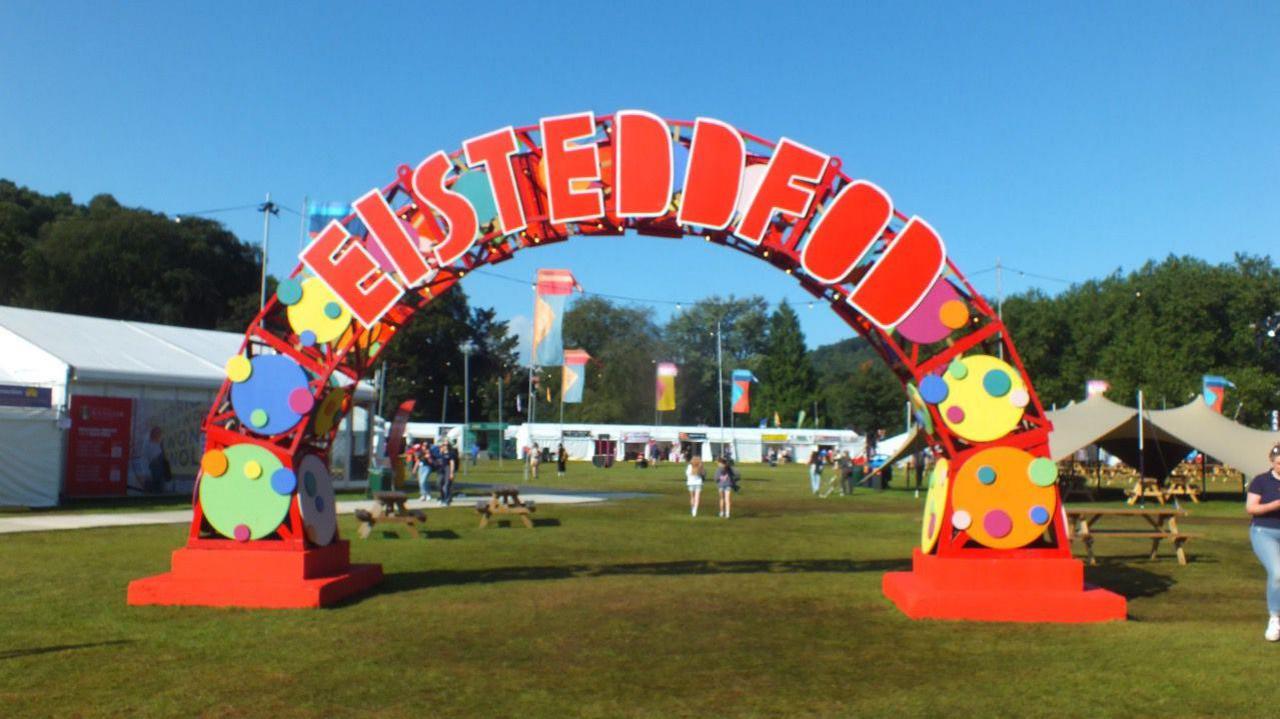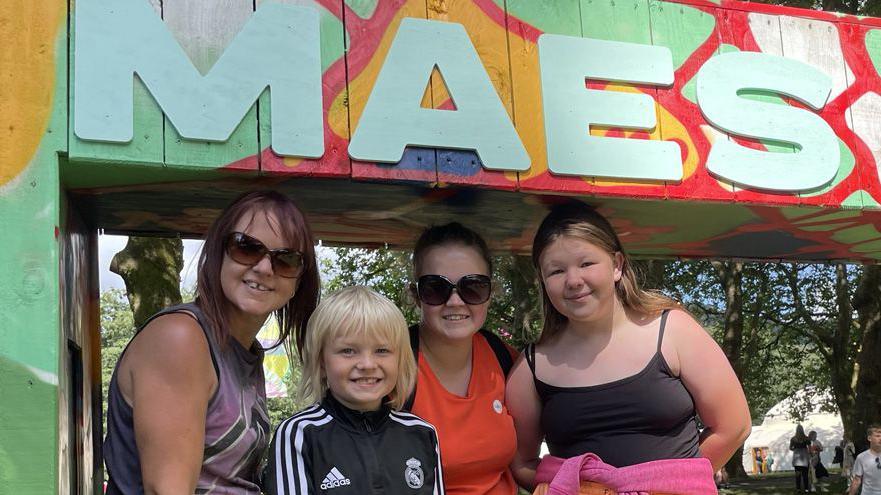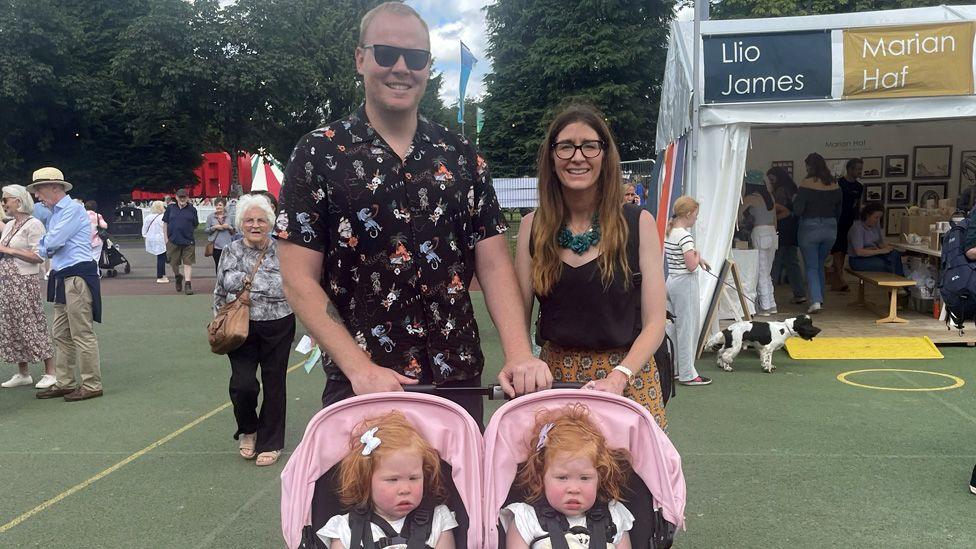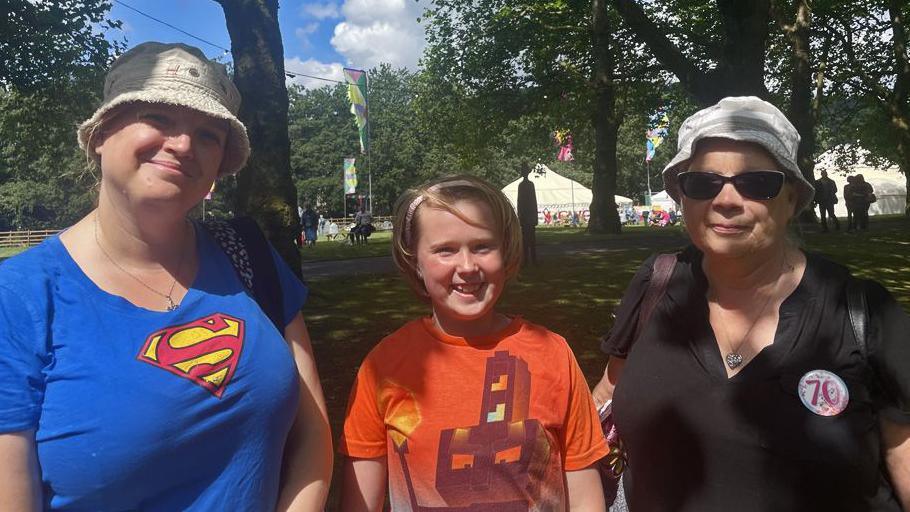What's it like at the eisteddfod as a non-Welsh speaker?

About 150,000 attendees are expected to attend the event at Ynysangharad
- Published
This week, thousands of people have descended on the National Eisteddfod, a festival celebrating the Welsh language - but not all of them spoke Welsh.
People in Rhondda Cynon Taf, which is not a Welsh language heartland, currently have Europe's largest cultural festival on their doorsteps.
But what is it like to go along, to take in the activities and entertainment, when you do not speak the language?
One Pontypridd resident said she had never heard so much Welsh being spoken in the area and it made her wish she knew more, but others felt the festival could do more to cater to learners.
After slow start, Pontypridd embraces Eisteddfod
- Published8 August 2024
Eisteddfod crowds urged to leave their cars at home
- Published6 August 2024
Student learned Welsh due to 'shame' attached to it
- Published7 August 2024
Rachel and Izabel Galliford, from Pontypridd, said they had "really enjoyed" the festival despite not speaking very much Welsh.
Izabel, 12, said she had been "excited" since her school, Ysgol Nant Gwyn, gave her free day tickets.
Her mum Rachel, 45, added: "There were loads of people, friends and family, who were saying 'why are you going because you don't speak Welsh. You won't understand everything'.
"But you don't need to understand it do you? You just come along and you take it all in.
"It's lovely hearing a lot of Welsh and you just think 'I wish I knew more'."
She said the map of the site was confusing as "obviously it's all in Welsh", but added people were quick to help.
"Everyone just seems lovely here."

Rachel, Owen, Morgann and Izabel said they were excited to explore the festival and take everything in
Nerys and James Cook brought their two-year-old twins Lili-Wen and Gwenllian to their first eisteddfod on Tuesday.
While Nerys grew up in Wales and speaks a little bit of Welsh, James is from London and is still learning the basics.
Nerys, 39, from Talbot Green, said there were "lots of people encouraging you to speak Welsh".
"As soon as they find out [James] is a non-welsh speaker, they’ve been teaching him some words," she said.
James, 43, added: "It was an old-boy who was trying to teach me 'dy nae dy nae' which means 'there there' I think?"
The couple said they did not feel the festival catered for English speakers trying to learn Welsh.
James said he had a hard time understanding what was happening as the billboards had no English translation and the family were not told about the festival's mobile app, which featured an English-language schedule.
"It's not a criticism but maybe there should something with the basics on, like a card or on a site map," he said.
"Even just having a billboard that says 'if you don't know Welsh come and speak to us' would be good."
"Thankfully coffee is coffi," he added.

James and Nerys Cook said their twins will be going to a Welsh language school
Nerys said: "As somebody who is Welsh and doesn't speak it fluently, there's a lot of people who approach you speaking Welsh, whereas normally people ask... it's a natural assumption here.
"If I speak a little bit, they'll reply in Welsh which is quite nice."
She said she had been able to understand and then reply in English.
"It does give that incentive... when you start speaking it you realise your limitations and it makes you want to do a bit more."

Lynsey, Clo Lee-Brassington and Audrey Lee said they got lost when they entered the festival because they did not understand the map
Lynsey and Clo Lee-Brassington from Llanharan were exploring the festival but got lost as the map confused them.
Lynsey, 39, said: "We were a little bit apprehensive coming because obviously a lot of it is in Welsh and we don't understand it, but we've been alright.
"Unfortunately, I asked somebody for help in English and he only answered me in Welsh which was not helpful, but we worked it out ourselves.
"So obviously some people are upset, but you can only do what you can."
She added other people had been happy to help her in English, adding they "don't often hear that much Welsh, but it's been nice".
"It does make you think how little you do know, you think you know more than you do until you try and translate it," she said.
The National Eisteddfod has been approached for comment.